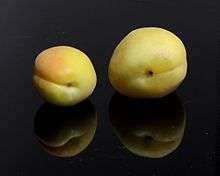left
English
Etymology 1
From Middle English left, luft, leoft, lift, lyft, from Old English left, lyft (“air, atmosphere”), from Proto-Germanic *luft- (compare Scots left (“left”), North Frisian lefts, leeft, leefts (“left”), West Frisian lofts (“left”), dialectal Dutch loof (“weak, worthless”), Low German lucht (“left”)), from *lubjaną (“to castrate, lop off”) (compare dialectal English lib, West Frisian lobje, Dutch lubben), from Proto-Indo-European *(s)leup, *(s)lup (“hanging limply”). More at lob, lop.
Pronunciation
- IPA(key): /lɛft/
Audio (US) (file) Audio (UK) (file) - Rhymes: -ɛft
Adjective
left (comparative more left or lefter, superlative most left or leftmost)
- The opposite of right; toward the west when one is facing north.
- (politics) Pertaining to the political left.
- Antonym: right

Derived terms
Related terms
Translations
|
|
|
|
Translations
|
|
|
|
Noun
left (plural lefts)
Derived terms
- lefty
- to the left
Translations
|
|
|
|
- The translations below need to be checked and inserted above into the appropriate translation tables, removing any numbers. Numbers do not necessarily match those in definitions. See instructions at Wiktionary:Entry layout#Translations.
|
Etymology 2
Middle English left, variant of laft (“remaining, left”), from Old English lǣfd, ġelǣfd, past participle of lǣfan (“to leave”). More at leave.
Verb
left
- simple past tense and past participle of leave.
- 1913, Joseph C. Lincoln, chapter 8, in Mr. Pratt's Patients:
- Afore we got to the shanty Colonel Applegate stuck his head out of the door. His temper had been getting raggeder all the time, and the sousing he got when he fell overboard had just about ripped what was left of it to ravellings.
-
Translations
|
|
Etymology 3
From a verbal use of leave (“permission”), perhaps connected to Middle English leven (“to give leave to, permit, concede”), from Old English līefan, lȳfan (“to allow”). More at leave.
Verb
left
- (Ireland, colloquial) permitted, allowed to proceed.
- We were not left go to the beach after school except on a weekend.
References
- The Concise Dictionary of English Etymology, Walter W. Skeat.